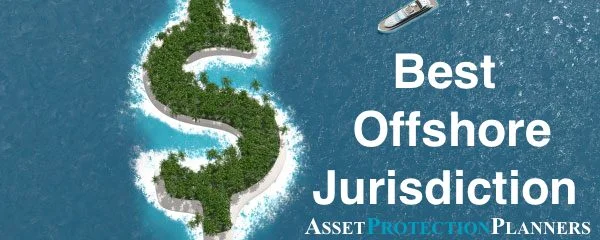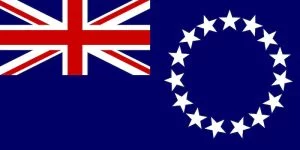
Protecting personal assets is important for any wealthy individual. Offshore jurisdictions are generally regarded as providing better asset protection than domestic jurisdictions. This is mainly because local courts and judges do not have power over foreign trustees. Moreover, many favorable offshore jurisdictions have laws which make it very difficult for foreign creditors to pursue assets.
We are a company that started in 1906 and establish asset protection structures domestically and around the globe. After substantial research, dealing with thousands of clients and decades of experience, we feel that Cook Islands is the top asset protection jurisdiction. In fact, the Cook Islands is widely regarded by many in the industry as the best offshore jurisdictions for personal asset protection.

Best Offshore Asset Protection Jurisdiction:
The Cook Islands
The Cook Islands offer strong privacy laws, fraudulent transfer protection, and the ability to retain a substantial control over assets. There are a number of legal vehicles which wealthy individuals can use for personal asset protection in the Cook Islands including trusts and limited liability companies.

Protection Against Foreign Judgments
The Cook Islands does not recognize foreign judgments. This is a huge advantage over domestic jurisdictions. Since courts do not recognize foreign judgments, potential claimants would be required to travel to the Cook Islands in order to try their cases in a local court. The time and cost associated with traveling to another country to try their cases are very discouraging. More often than not, creditors will decide that it is not worth the time and expense to pursue assets held in a Cook Islands asset protection structure. Plus, those who do decide to make claims against assets held in a Cook Islands can only make a claim of fraudulent transfer of assets. This is merely a civil matter and has no criminal implications. To clearly communicate the civil nature, the modern term for this accusation is a “voidable transfer.”

Fraudulent Transfer Protection
The biggest threat to personal assets held in any asset protection structure worldwide is a claim of fraudulent transfer. Fraudulent transfer claims occurs when assets are transferred with the expressed intent of delaying or defrauding creditors. Successfully making a claim of fraudulent transfer in a local court is the only way that a creditor could, theoretically, gain access to assets held in a Cook Islands asset protection structure. The burden of proof for fraudulent transfer in the Cook Islands falls on the creditor. The burden of proof for claims of fraudulent transfer in the Cook Islands is beyond a reasonable doubt. The creditor must prove that making the transfer made the debtor insolvent. They must also prove that transfer was made with the explicit intent of defrauding that specific creditor; i.e. not just any creditor, but the that particular one filing the claim.
The Cook Islands also has an extremely short statute of limitations regarding claims of fraudulent transfer of assets. Creditors have only one year to bring action against the settlor after the trust is formed and funded. Alternatively, they have two years from the “cause of action,” which is the reason the plaintiff filed the lawsuit. If the lawsuit was for an automobile accident, the date of the collision is the cause of action date. After the statute of limitations has run out on the fraudulent transfer claim, the courts will not entertain the case. They will reject it outright. There is a substantial amount of legal precedent which supports that assets will be protected in the Cook Islands. Literally thousands of cases have been tried where individuals used Cook Islands asset protection structures to successfully protect assets. This is not the case with domestic jurisdictions.
From personal experience, we have never had a client lose money from a fraudulent conveyance claim for whom we have established a Cook Islands asset protection trust. The financial and legal barriers have proven far too high for the judgment creditors to surmount.

Strong Financial Privacy Laws
Financial privacy is essential for asset protection. Creditors and money-hungry litigants will go after low-hanging fruit. If they can see that an individual has a substantial amount of assets, they are more likely to try to make a claim against those assets. They are less likely, however, try to pursue against assets which they do not know exist. The Cook Islands has some of the world’s strongest financial privacy laws.
Jurisdictions such as this one do not require the registration of the settlors of trusts or the founders of limited liability companies. The name of the trust, the name of the trustees, and the date of the trust deed are the only information which is made publicly available. Members and managers of LLCs are allowed to keep their own records. The company principles, themselves, keep company ownership and management information themselves. The company name, resident agent’s name and address is the only information which is disclosed publicly. One may also appoint nominee managers and/or members with a Cook Islands LLC.

Access To Assets Under Legal Duress
The Cook Islands also allow individuals to maintain more control over their assets when they are under legal duress. This is done by establishing a Cook Islands trust in combination with a limited liability company founded in the Cook Islands or another favorable jurisdiction. The assets which the settlor of the trust wants to protect are transferred to the LLC. The settlor of the trust is then appointed as LLC manager. Under normal circumstances, the settlor of the trust will be able to maintain control over the day-to-day operations of the LLC. Thus, the LLC acts as a remote control so that the settlor can control assets held within the trust.
In times of legal duress, however, the managerial role of the LLC is passed to the trustee. Trustees in these jurisdictions are barred from carrying out orders that foreign courts dictate. Additionally, they are prohibited from making distributions which they know a creditor is likely seize long as this was stipulated in the trust deed. This situation is referred to as “Impossibility to Act.”
“Impossibility to Act” is a legal situation where the settlor of a trust is under pressure from a court order. In this situation, the settlor will request a distribution, but the trustee will refuse to release the assets. They will do so on the grounds that the settlor is under legal duress. As a result, the settlor has fulfilled his or her obligation in the jurisdiction issuing the court order because they tried to get the assets. However, the creditor will be unable to obtain the assets because the trustee will refuse to release them. Meanwhile, the settlor has access to trust assets for personal use. This has shown to be an effective way for the settlor of an offshore trust to protect their assets. Using the above strategy significantly reduces the risk of claims of fraudulent transfer of assets. This is the case because it is the managerial role which is transferred from the settlor of the trust to the trustee. No transfers of assets were made while the creditor was making their claim.
The provisions of Cook Islands law allow for the trustee to pay bills for the settlor. The trustee may also pass funds to trusted family members or friends. These intermediaries may then pass the funds to the settlor. As a result, the individual using the Cook Islands asset protection structure has access to their assets while their creditors do not. All of these factors makes the Cook Islands the best trust strategy today for asset protection.

Protecting Your Home
The one which Cook Islands asset protection structure does not effectively protect is domestic real estate. Real estate is subject to the laws of the jurisdiction where it is located. For this reason, it is often advisable to combine a Cook Islands asset protection structure (for liquid assets) with a domestic asset protection structure for real estate.
We will talk about homestead protection in a bit. Aside from this, we will typically record an equity line of credit against real estate. We put provisions in the equity line such that it can grow as the value of the property increases. Initially this encumbrance that a mortgage or deed of trust secures is payable to the aforementioned LLC that the asset protection trust owns. That, in itself, would likely not hold up under intense questioning and in-depth court scrutiny. So, when the need arises, we have a third-party lender who buys the loan and places the proceeds into the offshore trust.
Now, this is not money you could run off with because this would pose too much risk to the lender. But since it is protecting dead equity, you would not be able to readily run off the money had you not encumbered it with this equity-stripping strategy. So, just like now, if you sell or refinance the property, that will create cash that you can use. Thus, funds from the sale or refi pay off the liens mentioned above and the proceeds are deposited into your offshore trust. Then the funds are freely accessible to you…but not to your legal enemy.

Homestead Protection
Now, let’s talk about homestead protection. The real estate asset protection strategies you use depend on the state in which the property is located. It also depends on whether the real estate is one’s primary residence or merely a second home or investment property. For example, some states have strong homestead protection laws for a primary personal residence. Homestead exemptions are laws provided in many states which protect some or all of the equity in an individual’s primary residence from creditors. Florida, Iowa, Kansas, Oklahoma, South Dakota and Texas are considered the states with the best homestead exemptions. They have provisions in their laws which, followed properly, allow for 100% of the equity to be protected. Most states have lower levels of protection; much lower.
The value of the homestead exemption in various states is based on a number of different criteria. These criteria include marital status, status as a family unit, and the age of the homeowner. Some states provide an increase in homestead protection for married couples, disabled persons and the elderly.
It is essential to note that the homestead exemption can be used to protect equity from most creditors. However, there are still certain creditors who may still reach assets protected by the exemption. These creditors include federal or state governments for tax claims, as well as child support and alimony claims. Additionally, creditors who successfully obtain judgements against the homeowner may be able to force the sale of the home. After the sale of the home, they have the ability to keep all of the unprotected proceeds from the sale which the judgment covers up to the amount the debtor owes. So, in most situations it makes sense to take the equity out of the home using the equity stripping methods mentioned above. Alternatively, after establishing a Cook Islands trust and LLC, you can get a second mortgage or refinance the property and place the proceeds into your offshore asset protection structure.

Cook Islands Background
The Cook Islands are located in the South Pacific Ocean between Hawaii and New Zealand. They derive their name from Captain Cook, who sighted the island in 1770. The Cook Islands became a British protectorate in the year 1888. In 1900, New Zealand took over administrative control of the islands. Since 1965, the Cook Islands have been self-governed. They still enjoy a free association with New Zealand. Emigration of skilled workers from the Cook Islands to New Zealand is very common. The Cook Islands have a GDP of roughly US$ 300 million. Tourism is the largest sector in the Cook Islands. This is a result of its beautiful beaches, temperate weather, and rich local culture. A stable government and strong economy make the Cook Islands an ideal jurisdiction to use for, you guessed it, offshore asset protection.



